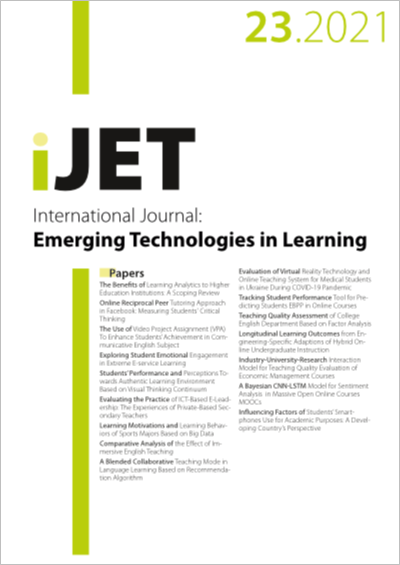Influence of Teacher Intervention on College Students’ Metacognition in an Online Collaborative Learning Environment
DOI:
https://doi.org/10.3991/ijet.v18i21.44823Keywords:
Key Words—Online collaboration; teacher intervention; college students; metacognitionAbstract
The rapid development of the Internet, big data, and mobile Internet technology has resulted in the emergence of online collaborative learning as the primary mode of collaborative learning. Although online collaborative learning is flexible and autonomous, the learning performance of learners is not high. One of the main problems that perplexes teachers in online teaching is the high dropout rate but low completion rate. Online education has become increasingly important for improving the quality of students’ learning. Teachers’ rational use of resources, strategies, and other intervention techniques can significantly enhance the quality of online education. Exploring the effect of teacher-led classroom interventions on college students’ metacognition under the collaborative learning mode can further integrate information technology with classrooms and promote the improvement of classroom learning and teaching effectiveness. Two parallel classes, consisting of 80 students each, were selected as research subjects at Harbin University of Science and Technology in Heilongjiang Province, China. The aim of the study was to investigate the impact of teacher intervention on college students’ metacognition (specifically, metacognitive planning, metacognitive monitoring, metacognitive regulation, and metacognitive evaluation) in an online collaborative learning environment. Results show that there is no significant difference in the online collaborative learning experience between the experimental class and the control class (P = 0.3542 > 0.05). Nonetheless, the experimental and control groups differ in their metacognitive planning (t = 3.943, p = 0.000), metacognitive monitoring (t = 2.464, p = 0.016), metacognitive regulation (t = 2.024, p = 0.046), and metacognitive evaluation (t = 3.675, p = 0.000). These findings indicate that teacher intervention promotes metacognition among college students. The findings have significant reference value for the seamless integration of online teaching resources and teachers’ instruction, the customization of students’ individualized learning paths, and the enhancement of online collaborative learning performance.
Downloads
Published
How to Cite
Issue
Section
License
Copyright (c) 2023 Erdong Zheng, Qiuying Wang

This work is licensed under a Creative Commons Attribution 4.0 International License.



